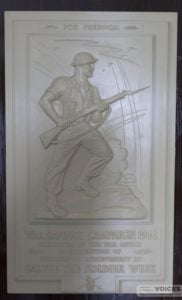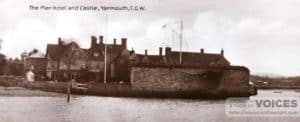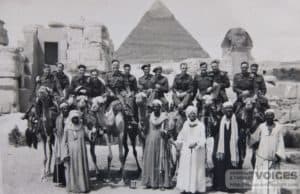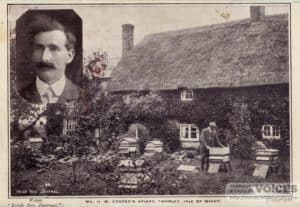I remember the Navy used to take their boats to Yarmouth on a courtesy call. It was good. You could go out and visit the ships, – there was one called ‘Yarmouth’. During the war if you paid to go the ship, you were paid back in savings stamps. All sorts of things you could go on, but you were paid back in savings stamps. Pauline Harwood nee Hatch b 1930
Tag Archives: 1940s
Mary Lord: WWII, school, rations 1940s
My best friends at that time were evacuees, but we weren’t especially aware of the war, even though my dad was working in a shipyard in Cowes.
We were always hungry, we used to eat the acorns from the trees in the playground. We didn’t eat very many because they took so long to peel. We were sent out to pick blackberries, and rosehips for vitamin c to supplement the food. It must have been along the railway line, and there were still trains, but I don’t remember any warnings or worries. The boys didn’t do much picking, just opened up the rosehips and put the seeds down people’s necks as itching powder.
I remember getting occasional packets of chocolate powder which was supposed to be for making hot chocolate, but my mother used to let me sit on the doorstep and dip my finger in the powder, the nearest we got to sweets, although later we did have a 2oz ration from Mr. Burt’s shop. Mr Burt’s shop
Mary Lord b 1936
Nick Chandler : WWII boys
Although there was a war on, we used to get about all over the place. Out Bouldnor, there were troops out there. We used to go over Thorley Copse a lot, play down the marsh and up the Rec, on the beaches, anywhere; it was amazing really.
I remember towards the end of the war we went over Sandhard and found an airman’s glove on the beach. We picked it up and 2 fingers fell out of it. I remember that ever so well.
One day 2 or 3 of us older boys went up Red Lake where the old sewer pipe was and were walking along it. We got machine gunned by a Messerschmidt and we all leapt off it. We reckoned at the time they thought it was part of Pluto. Nick Chandler b 1937
Pier Hotel: WWII, WRNS 1940s
During WWII, The Pier Hotel, now The George, was central office for ‘XDO West’ signals.
Signatures of WRNS, Marines and others stationed at Pier Hotel 1940s
Blanche Kennard : WWII WRNS 1940s
My father worked on a farm near Ryde, which was where I grew up. I had a friend Peggy and we went everywhere together, so we both applied to join the WRNS. I thought I’d join the WRNS and see the world. Peggy passed and went to Eastbourne but I didn’t – I had a couple of teeth which needed fixing and they wouldn’t have me till they were done.
After my 2 weeks training they sent me to Yarmouth. I didn’t like it at first, I wanted to be with my friend, but after a fortnight I loved being in Yarmouth. I was a caterer, the Petty Officers’ Steward for the officers stationed in the Pier Hotel (now The George). My job was to serve them their food in The Kings Head, and help in the kitchen and do the shopping. I used to go up to Ablitts to buy their meat. Blanche Kennard nee Dore b 1922
Ralph Smith: WWII
When war broke out I was working in Mills Grocers shop and driving their delivery van. Ralph Smith, who worked there too, was a pork butcher. He and I were near enough courting (and married 1945). He joined the Isle of Wight Territorials, ( Princess Beatrice’s Own) at Freshwater on March 4th, 1939 and was mobilised at the end of July and stationed first of all at the Needles Battery, on Coastal Guns.
Ralph manned a Lewis gun during the Battle of Britain, served in Algeria, Medjes el Bab, Tunisia with the Ist Army, in Italy, Monte Casino, Tel Aviv, Palestine, Greece, back to Italy before VE Day. After VE Day, he was sent to Klagenfurt, Austria, Germany and Belgium. He was demobbed on March 1st 1946.
Effie Pitman: WWII work 1939, 1940s
Of course when war broke out Mr. Gobini had to go because he was Italian.
I was with the A.R.P. in the evenings in the Town Hall, taking telephone messages with Eileen Smith. We had to phone in to Newport when there was an air raid.
It was so dark at night with no lights, I hated it.
Then in the morning the bus came for us at a quarter to 7 so we didn’t always get much sleep.
I was sent to Cowes to work in the shipyard, riveting. It was horrible! My face used to be black when I got home. Some of the other girls weren’t very nice, their language….
Once I was put with a man who was on piece work. We had to work so fast! Another time a man came to see us to ask us to rivet a flag pole. We said ‘We cant do it!’ but we did, over 700 rivets , and you had to be so careful otherwise it bent.
My aunt had some evacuees to stay with her. Poor little mites. They must have been so unhappy away from home. Effie Pitman b 1920
Ron Wallis: Thorley WWII 1940s
WWII: a boy’s perspective
From 1941 we were living at Lee Farm, Dad was bailiff for Granny Haigh. Later we moved to Thorley Lodge, then Michaelmas Cottage ( now South Lee) and eventually North View.
I can remember seeing the overturned earth from bombs which dropped adjacent to the railway line just east of the Lee Brickyard. I imagine they were trying to hit the railway line. How many bombs it was I don’t know, but I can remember seeing two craters.
I was outside with father one night, because when he was not on Home Guard duty, he used to love being outside watching it all go on, and you could see the search lights and the anti aircraft shells bursting. All of a sudden there was this terrific screech, which you did get occasionally when you had stuff coming down. And there was this bang and the next morning father found this large piece of shrapnel which had gone through the roof of the meal house. It was about twenty yards away from where we were standing.
There was a gun emplacement at the top of Broad Lane, a bit before you get to Dog Kennel, on the side of the road there where there’s a footpath goes across. It was only about twelve foot square. Where the Home Guard used to go night time I don’t know, Brook, I think. Father did have a rifle quite quickly after the Home Guard was formed, although they didn’t have enough to go round. Yes, he was handy with a shotgun. As well as having a couple of shotguns of his own, he did have a revolver and very nice large knife, a beautiful thing, illegal these days. Him and Bill Welstead were Home Guards.
I would have ten or nine, I remember being fairly close to the old estate carpenters shop and I could hear vehicles coming in through the gates. At that time, closest to Thorley Lodge was a granary and that big stone barn, and alongside that was a double tin barn. I was there playing, and these vehicles came in and scattered themselves around the area in the yard and adjacent fields. There were three or four fifteen hundredweight Bedford type things with lots of aerials sticking out, with canvas backs. One had a solid back, if I remember it was a Commer. There was at least one armoured scout car, couple of motorcycles and two or three large-ish type jeeps – and the men had an odd uniform with pill box type peak caps for officers. I didn’t know what they were saying or who they were. It was only when father took them down a basket of eggs we found out, not what they were about, but who they were – French. They were there probably for two days and then one morning they were gone. That was a few days before or after D Day June ’44.
We milked in the long stable and the cows would have just been chained up. It was quite a herd.
I think there was about eighteen in the bottom shed and six or seven in the top shed, twenty five milked by hand. One man could milk twelve, they reckon, so there must have been two men milking.
We had an Italian Prisoner of War, Giovanni Azara, he became head milker along with father. Father was always up at half past five every morning and they used to bring ‘Johnny’ over about seven o’clock.
He arrived probably ’42. He had farming experience, I think he was from the Po Valley agricultural area so he knew what he was doing and he loved being with the cows. He had a terrific pride in his work. He was lovely chap. I would think he was about twenty.
You weren’t supposed to allow them in the house or anything. I must admit mother flaunted the rules a bit towards the end particularly. We had to get permission to give him a crucifix when he left and I can remember him hugging mother and crying because he didn’t want to go home.
We didn’t have holidays. Gracious no. Went to Grandmother’s and Auntie’s for tea on Sunday. We weren’t short of food. Father could go and shoot a few rabbits, there were plenty about.
I remember there were two old ladies, spinster ladies, the Misses Vaudrey. They lived over at Cranmore somewhere. And they used to come two or three times a week with mashed fish and stuff to feed the farm cats.
There were some celebrations I remember, I’m sure it was VE day. My grandmother and two of my uncles lived at Marks Corner, and I can remember going up there and there was a great big long table laid out with lots of goodies. Some of the soldiers in Parkhurst Forest were Canadians but I think these were Americans; they seemed to provide all the goodies. We had a big party to celebrate. But I don’t remember any parties going on in the Yarmouth area. I think it was just a sigh of relief. Ron Wallis b 1935
Henry Cooper: Upper Lee, Thorley, 1900s – 1960s
Upper Lee
Henry (Harry) Martin Cooper (1877-1969) was born at Upper Lee Farm, Thorley, and lived there most of his life. He had no formal education, but was self-taught having learned the basics from his mother. In 1902 his diary first mentions his bee-keeping activities, which provided additional income to supplement the income from the small family dairy farm.
I remember my dad telling me the field names – Long Meadow, Goose Acres, Pyle Field. I have a feeling that Grampy rented Vicarage Butts, but I couldn’t be sure. He strongly objected to having to pay tithes for some land he had. I wonder if that was for Vicarage Butts? Rosemary Cooper granddaughter of Henry
When it comes to fruit trees I can remember damsons, greengages and Victoria plums at Thorley, but I have no idea what the apples were, except plentiful. (There was a thorn apple that I was told by Mum to keep quiet about!)
I’ve a feeling there were apricots too? Grandma and Aunt May used to bottle lots of fruit but apart from plums I think it must have been mainly soft fruit. When they moved to Parkside my first memory was of the larder there with the shelves of jewel-like colours, the light shining through their store of bottled fruit brought from Thorley I think. At Upper Lee it must have been kept in the Dairy where there wasn’t so much light. Stella Ridley, Grand daughter
Mum said they loved going over to the Coopers at Upper Lee to Sunday School and then go in to the hall in Newport. It was a treat for them. They used to go and collect the milk in a jug from them at the farm. Mary Henderson b 1954
May Cooper used to do the dairy work for her brother. She made butter pats in the shape of swans, and cooled them in Thorley Brook, just where a little spring rises. When she made jellies and jams she’d cool them by floating them in the stream. Eileen Smith nee Lansdowne b 1921
Mary Henderson, Margery Henderson: Thorley 1940s
Margery Henderson, my Aunt Marge, Dad’s sister, has lived in Canada since she married a Canadian soldier in WWII and went out as a War Bride. She’s in her nineties now and has children and grandchildren there.
Recently she told me she wished she’d never gone out. She can remember going across the Common in an Army wagon with her husband and couple more of the Canadian soldiers who were over here, and thinking, ‘What have I done?’ But she said in those days, you didn’t admit it. Her mum would have been horrified.
Her father, Vic Henderson, my grandfather, came off his bike through Wilmingham one frosty morning, coming back from coastguard duties. They thought he’d cracked his ribs, had this terrible pain, and Marge was sent for in Canada. Her husband worked for Canadian Pacific, up in the logging camps right up north. It took her two days to get to a train to take her to get a boat and they were becalmed coming across. It took her two or three weeks to get home. When her mum met her at Liverpool she thought, ‘Why’s Mum meeting me?’ By that time he’d died, but her mum, my Gran Henderson, didn’t tell her till they’d travelled back to the Island.
Mary Henderson b 1954










